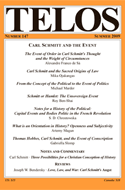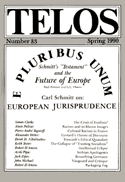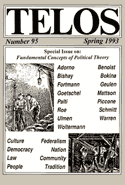In today’s episode of the Telos Press Podcast, David Pan talks with John Milbank about his article “A Tale of Two Monsters and Four Elements: Variations of Carl Schmitt and the Current Global Crisis,” from Telos 201 (Winter 2022). An excerpt of the article appears here. In their conversation they discuss the three idioms into which Milbank divides Carl Schmitt’s thought; why they should be seen as separate idioms rather than different aspects of a single perspective; the extent of overlap between the idioms; whether the decisionist Schmitt is as arbitrary as he is made out to be; the characteristics of a medieval European conception of nomos that Schmitt wishes to retrieve; the similarities between Schmitt’s third idiom of global regions and both Nazism and Russian theorists like Gumilev, Panarin, and Dugin; Schmitt’s decisionism, basic values, identity, and thinking through popular sovereignty. If your university has an online subscription to Telos, you can read the full article at the Telos Online website. For non-subscribers, learn how your university can begin a subscription to Telos at our library recommendation page. Print copies of Telos 201 are available for purchase in our online store.
|
“Some believe themselves to be experiencing the end of the world. In reality we are only experiencing the end of the relation between land and sea, which had held up to this point. Still, human angst [Angst] in the face of the new is often as great as the angst in the face of the void, even when the new is the overcoming of the void. Thus, the many see only senseless disorder, where, in reality, a new sense struggles for its order. Admittedly, the old nomos falls away and with it a whole system of received measures, norms, and relations. But that which is coming is not therefore only measurelessness or a nothingness hostile to nomos. Even in the embittered struggle of old and new forces, just measures emerge and sensible proportions are constructed.” —Carl Schmitt, Land and Sea: A World-Historical Meditation “Every fundamental order is a spatial order. One speaks of the constitution of a country or a piece of earth as of its fundamental order, its Nomos. Now, the true, actual fundamental order touches in its essential core upon particular spatial boundaries and separations, upon particular quantities and a particular partition of the earth. At the beginning of every great epoch there stands a great land-appropriation. In particular, every significant alteration and every resituating of the image of the earth is bound up with world-political alterations and with a new division of the earth, with a new land-appropriation.” As an occasional feature on TELOSscope, we highlight a past Telos article whose critical insights continue to illuminate our thinking and challenge our assumptions. Today, Linas Jokubaitis looks at Paul Piccone and Gary Ulmen’s “Schmitt’s ‘Testament’ and the Future of Europe” from Telos 83 (Spring 1990). |
||||
|
Telos Press Publishing · PO Box 811 · Candor, NY 13743 · Phone: 212-228-6479 Privacy Policy · Data Protection Copyright © 2025 Telos Press Publishing · All Rights Reserved |
||||
 Central to Carl Schmitt’s geophilosophy is his view that law is intrinsically linked to the physical location. This connection between the terra firma and the law is an essential element of what he refers to as nomos. Schmitt sees this as the most authentic form of law, distinguishable from views that perceive law as a normative or positive regime. In his article “Carl Schmitt and the Sacred Origins of Law,” Mika Ojakangas elucidates Schmitt’s conception of nomos, its relation to Schmitt’s view of mythopolitical legitimization of the state, and the consequences of rejecting the notion of such a link by secularization.
Central to Carl Schmitt’s geophilosophy is his view that law is intrinsically linked to the physical location. This connection between the terra firma and the law is an essential element of what he refers to as nomos. Schmitt sees this as the most authentic form of law, distinguishable from views that perceive law as a normative or positive regime. In his article “Carl Schmitt and the Sacred Origins of Law,” Mika Ojakangas elucidates Schmitt’s conception of nomos, its relation to Schmitt’s view of mythopolitical legitimization of the state, and the consequences of rejecting the notion of such a link by secularization.  When Schmitt drafted his lecture “The Plight of European Jurisprudence” in 1944, he had reasons to believe that it would be his last lecture. After a failed assassination attempt on Hitler, his friend Johannes Popitz was arrested as an important conspirator in the plot and was later put to death. This is why the article by Paul Piccone and Gary Ulmen on this lecture is called “Schmitt’s ‘Testament’ and the Future of Europe.” The lecture did not prove to be Schmitt’s last. The irony is that what Schmitt wrote as his own testament can today be read as a testament of Europe. The validity of this claim depends only on how one views the current state of Europe.
When Schmitt drafted his lecture “The Plight of European Jurisprudence” in 1944, he had reasons to believe that it would be his last lecture. After a failed assassination attempt on Hitler, his friend Johannes Popitz was arrested as an important conspirator in the plot and was later put to death. This is why the article by Paul Piccone and Gary Ulmen on this lecture is called “Schmitt’s ‘Testament’ and the Future of Europe.” The lecture did not prove to be Schmitt’s last. The irony is that what Schmitt wrote as his own testament can today be read as a testament of Europe. The validity of this claim depends only on how one views the current state of Europe.  As indicated by its title, Carl Schmitt’s essay addresses to two problems: (1) what are the basic questions that we must raise about the social and the economic order? (2) how are those questions properly formulated? A moment’s reflection should reveal to us the great generality of these problems, which are designed—so Schmitt says—to answer a need for “comprehensive consideration” of social life in its unity (52). Whether we are asking about orders democratic, non-democratic, capitalist, or socialist; whether we inquire into totalitarianisms, fascisms, traditionalisms, ethno-nationalisms; whether we put the question to republics or princedoms, Schmitt is indicating that there are basic questions to ask, and he is suggesting that he has the key to their proper formulation.
As indicated by its title, Carl Schmitt’s essay addresses to two problems: (1) what are the basic questions that we must raise about the social and the economic order? (2) how are those questions properly formulated? A moment’s reflection should reveal to us the great generality of these problems, which are designed—so Schmitt says—to answer a need for “comprehensive consideration” of social life in its unity (52). Whether we are asking about orders democratic, non-democratic, capitalist, or socialist; whether we inquire into totalitarianisms, fascisms, traditionalisms, ethno-nationalisms; whether we put the question to republics or princedoms, Schmitt is indicating that there are basic questions to ask, and he is suggesting that he has the key to their proper formulation. 

